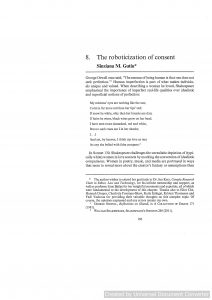Cybersex, Virtual Reality (VR), Sex Robots, & Sex Dolls
The Roboticization of Consent
 Full Article Title: The Roboticization of Consent
Full Article Title: The Roboticization of Consent
Open Access: Yes
Abstract
Technology has the power to redefine how women are stereotypically depicted in society. Unfortunately, sex robots – or “sexbots” – replicate existing gender imbalances, as the technology circumvents consent and emulates female sexual slavery. This chapter explains how sex robots can impact the existing gender inequalities and the understanding of consent in sexual interactions between humans. Sexbots, some of which have already entered the market to varying degrees of functionality and human-like responsiveness, will all have one thing in common – consent will be irrelevant. Sexbots do not have the ability to decline, criticize, or become dissatisfied with the user. In fact, female sexual slavery is eroticized. The author describes the technology used to create sexbots, their function, and society’s reaction to sexbots, finding that misogynistic beliefs can be found in the design of, use of, and reactions to female robots. Sexbots diminish the social and legal importance of consent by commoditizing females in the context of a uni-directional sexual relationship. Female robots – or “gynoids” – are often assigned stereotypical female traits, which reproduce unrealistic ideas about women’s physical traits and disposition. The inequalities portrayed by gynoids also risk being appropriated by the technology, with gynoids becoming racialized and sexualized. The misogynistic reactions to female robots existing today are a genuine concern, and may further entrench such stereotypes about human females. The documented harms of extreme pornography, the expected harms of sexbots, and the legal concepts of harm under Canadian and U.S. legal systems are discussed. The author concludes that future legal solutions must consider sexbots’ impact on gender inequality.
Citation
Gutiu, S. M. (2016). “The roboticization of consent”. In R. Calo, M.A. Froomkin, & I. Kerr (eds.), Robot Law (pp. 186-212). Cheltenham, UK: Edward Elgar Publishing. https://doi.org/10.4337/9781783476732.00016

